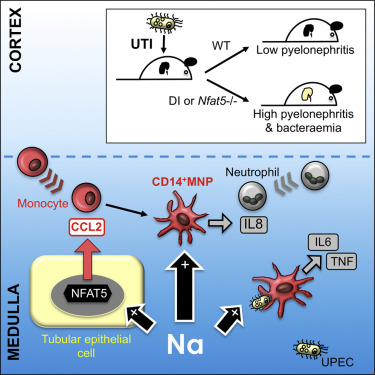Our official English website, www.x-mol.net, welcomes your
feedback! (Note: you will need to create a separate account there.)
Renal Sodium Gradient Orchestrates a Dynamic Antibacterial Defense Zone.
Cell ( IF 45.5 ) Pub Date : 2017-Aug-24 , DOI: 10.1016/j.cell.2017.07.022 Miriam R. Berry , Rebeccah J. Mathews , John R. Ferdinand , Chenzhi Jing , Kevin W. Loudon , Elizabeth Wlodek , Thomas W. Dennison , Christoph Kuper , Wolfgang Neuhofer , Menna R. Clatworthy
Cell ( IF 45.5 ) Pub Date : 2017-Aug-24 , DOI: 10.1016/j.cell.2017.07.022 Miriam R. Berry , Rebeccah J. Mathews , John R. Ferdinand , Chenzhi Jing , Kevin W. Loudon , Elizabeth Wlodek , Thomas W. Dennison , Christoph Kuper , Wolfgang Neuhofer , Menna R. Clatworthy

|
Lower urinary tract infections are among the most common human bacterial infections, but extension to the kidneys is rare. This has been attributed to mechanical forces, such as urine flow, that prevent the ascent of bladder microbes. Here, we show that the regional hypersalinity, required for the kidney's urine-concentrating function, instructs epithelial cells to produce chemokines that localize monocyte-derived mononuclear phagocytes (MNPs) to the medulla. This hypersaline environment also increases the intrinsic bactericidal and neutrophil chemotactic activities of MNPs to generate a zone of defense. Because MNP positioning and function are dynamically regulated by the renal salt gradient, we find that patients with urinary concentrating defects are susceptible to kidney infection. Our work reveals a critical accessory role for the homeostatic function of a vital organ in optimizing tissue defense.
中文翻译:

肾钠梯度协调动态抗菌防御区。
下尿路感染是最常见的人类细菌感染之一,但很少延伸到肾脏。这归因于机械力,例如尿流,其阻止了膀胱微生物的上升。在这里,我们显示了肾脏的尿液浓缩功能所需的局部高盐度,指示上皮细胞产生趋化因子,使单核细胞衍生的单核吞噬细胞(MNP)定位于髓质。这种高盐环境还增加了MNP固有的杀菌和中性粒细胞趋化活性,从而产生了防御区。由于MNP的位置和功能受肾盐梯度的动态调节,因此我们发现尿液浓缩缺陷患者容易感染肾脏。
更新日期:2017-08-10
中文翻译:

肾钠梯度协调动态抗菌防御区。
下尿路感染是最常见的人类细菌感染之一,但很少延伸到肾脏。这归因于机械力,例如尿流,其阻止了膀胱微生物的上升。在这里,我们显示了肾脏的尿液浓缩功能所需的局部高盐度,指示上皮细胞产生趋化因子,使单核细胞衍生的单核吞噬细胞(MNP)定位于髓质。这种高盐环境还增加了MNP固有的杀菌和中性粒细胞趋化活性,从而产生了防御区。由于MNP的位置和功能受肾盐梯度的动态调节,因此我们发现尿液浓缩缺陷患者容易感染肾脏。











































 京公网安备 11010802027423号
京公网安备 11010802027423号